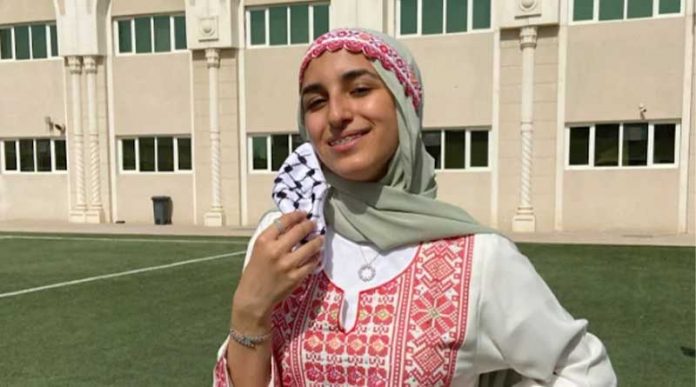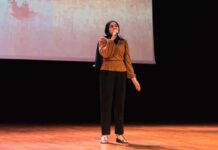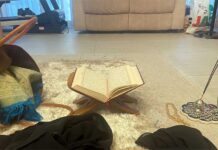Palestinian youth in the United Arab Emirates stay connected to their culture and identity in many ways, but one thing that unites them is their collective and continuous aspiration for freedom
By Zahra Rashid
The sun is rising on her drive to university, and the melodies of Kouni are dancing in her car.
The wind’s soft hum reminds her of the olive trees in her front yard back home, swaying in the early mornings.
The occasional honk of a car horn in the distance is like the clattering of pans she hears, as her aunt prepares hummus and boiled eggs for breakfast.
The whizz of cars passing her by is reminiscent of the little kids she would watch running around playing catch in her village.
Each strum of the oud and each rhyming lyric brings her closer and closer to her home in Beit Sourik, West Jerusalem.
She might be sitting in the front seat of her car on the E311, but in her mind, she’s relaxing on her grandmother’s swing while the sun caresses her skin and the birds sing to her from the sky.
Jana Faisal Aljamal, a 23-year-old Palestinian girl brought up in the UAE, said that it is those quiet moments in the morning that she truly feels connected to her country.
“I indulge myself in an alternate reality where I am transcending borders and truly feeling the essence of Palestine within me,” she said.
Aljamal said that staying involved with her culture and identity was not necessarily hard, living in the UAE.
“The Palestinian community always finds itself and we always draw closer together. During Eid, Ramadan, weddings, any occasion really, we make sure to create the Palestinian version of it.”
She also said that her parents played a vital role in instilling Palestinian values within her and preserving their cultural atmosphere.
“A lot of Palestinians would share a similar experience because our parents are usually very scared that we will let go of our national identity. We are prone to it, so they would go the extra mile to remind us of who we are.”
Ghazal El Gharably, 17, also grew up in the UAE and is one of these Palestinian children whose parents carefully etched their traditions and lifestyle within.
“My mother only came here in 2003 as she was born and lived the first 18 years of her life in Gaza. Everyone refers to the food she makes as ‘the best Gazawi food’ which includes dishes like msakhan, maqlouba and vine leaves.”
This is one of the fundamental ways El Gharably remains connected to her culture, along with spending time with family on celebrations like Eid and dressing up in traditional clothing.
Most of Yarah Arikat’s family, on the other hand, don’t live in the UAE. She was born and spent her childhood in Cardiff, Wales, before moving to Sharjah. Her family originates from a village behind what is known as the “apartheid wall” named Abu Dis in East Jerusalem.
“I feel like when I am around my family, even outside of Palestine, is when I feel the most active and connected with my culture.”
Arikat said that she rarely comes across fellow Palestinians who visit frequently, so whenever she does, she will always try and engage in conversation with them and exchange experiences.
“This makes me feel closer to my home country because I hear someone else speak of the things I felt like I was the only one who knew about here.”
Similarly, Aljamal makes a conscious effort to to make sure everyone around her knows about Palestine.
“Not only to be politically aware but to also know how beautiful it is and how nice our people are.”
She thinks this is because everything she has done in her life so far is for Palestine, and is motivated by her pursuit for liberation.
“I chose my two majors, International Relations and Journalism, to understand politics further, to offer political representation for Palestine and to try and depict the reality of Palestinians.”
Arikat agrees, saying that the reason she went into Health Sciences at university is so she can aid in recovery at hospitals back home.
“I want to use my knowledge to help the less fortunate. With my degree, I hope to return to Palestine and volunteer as much as I can.”
A social media intifada
In May of 2021, families in the village of Sheikh Jarrah were being threatened by Israeli forces to be forcefully expelled from their homes. As this news trickled through social media, people began sharing it, commenting on it and trying to understand the situation further.
#SaveSheikhJarrah became a trending hashtag with thousands of posts on many social media platforms. The movement highlighted voices from youth living in the neighborhood itself, such as Muna and Muhammed El Kurd.
“It was very powerful. Even influencers started noticing it and so many people became more aware,” said El Gharably.
“I think that was the most successful thing in the pursuit for freedom that happened for a very long time.”
Aljamal echoed this, adding that for a moment, she left victorious.
“This was the first time Palestine won the media war. Not because of mainstream news platforms supporting us but because people actually believed Palestinians for who they were and truly understood what it means to resist.”
While Arikat acknowledges this, she doesn’t think social media does anything for Palestinians besides spreading awareness.
“The clashes from last spring is just another day for your average Palestinian living in Jerusalem. We live in an age where the brutality faced against Palestinians is either overlooked, expected or twisted around online. So in terms of creating a difference and helping us gain freedom, [social media] does not have as great of an impact as I wish for.”
El Gharably, too, shares this sentiment and questions the value of social media.
“People have started to ignore and neglect the situation as a result so I can’t confidently say whether it is helpful or not.”
Regardless, with post after post of human rights violations and brutality on social media comes severe desensitization, especially for Palestinians watching from the diaspora.
“One of the saddest things is that you become extremely numb to all of it,” said Aljamal.
“People would think that each time seeing it would trigger some trauma, but the reality is that it is no longer traumatic because of how much exposure there is and how much we have been through as a nation.”
She recalls a “gut wrenching” moment from when she was visiting Palestine as a child, in comparison.
“The first time an Israeli soldier cocked a gun in front of me, I was six years old. I was so terrified and I wanted to cry. But now, because of how much I have experienced it [over the years], I don’t even flinch.”
Arikat said that when she was younger, seeing anything of the sort would leave her distraught.
“It still makes my heart ache, but sadly I have become more used to it now.”
El Gharably highlighted how she uses social media to remain updated with the news on the ground, but sometimes, comes to the horrific realization that it is all real.
“I sit with myself and I’m like ‘these are actually my people [getting attacked]’.”
There are positives that come with having access to social media, though, such as connecting with family and friends back home.
Aljamal said she loves to occasionally get word about how everyone is doing in her village.
“Who’s getting married, who’s getting divorced…all the gossip. My connection with my culture is more about community than the material aspects like clothes or performances.”
“I hope that once I graduate and go back home, I can use my education for the better and give back to those who need it. These thoughts help me cope with witnessing [brutality against Palestinians online],” said Arikat.
Dreams from exile
“My ultimate dream is to live in Palestine and raise my kids there.”
Aljamal also said she yearns to be surrounded by Palestinians, everywhere she goes.
“I want to sit in a taxi where the driver is Palestinian, go to a coffee house where the barista is Palestinian, drink Palestinian coffee, spend time with my friends and family who are all Palestinian.”
She feels like a lot of people get to live this reality without even knowing it, and they take it for granted.
Meanwhile, El Gharably said she currently cannot visit Jerusalem so she dreams of a day where she can pray in Al Aqsa Mosque.
“It feels like a very far dream but I have faith that it will come true, with the will of God.”
Arikat shares this dream, and wishes for a life where Palestinians that are scattered across the globe can return to their homeland freely and enjoy their culture firsthand.
“I wish that we can get recognized without having to be associated with Israel and the genocide or terror that comes with their occupation,” she added.
“[In my dreams] Palestine is finally seen as something other than a war ridden country.”
Aljamal said that “people get to go to a place where they are so sure that they belong. A place they call their homeland because everything feels like home.”
“I yearn to go home to the real free Palestine.”




















